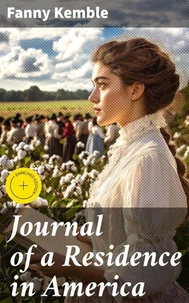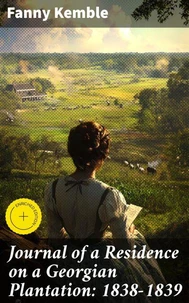Journal of a Residence on a Georgian Plantation: 1838 - 1839
Par :Formats :
Disponible dans votre compte client Decitre ou Furet du Nord dès validation de votre commande. Le format ePub est :
- Compatible avec une lecture sur My Vivlio (smartphone, tablette, ordinateur)
- Compatible avec une lecture sur liseuses Vivlio
- Pour les liseuses autres que Vivlio, vous devez utiliser le logiciel Adobe Digital Edition. Non compatible avec la lecture sur les liseuses Kindle, Remarkable et Sony
 , qui est-ce ?
, qui est-ce ?Notre partenaire de plateforme de lecture numérique où vous retrouverez l'ensemble de vos ebooks gratuitement
Pour en savoir plus sur nos ebooks, consultez notre aide en ligne ici
- Nombre de pages277
- FormatePub
- ISBN859-65--4702134-6
- EAN8596547021346
- Date de parution28/05/2022
- Protection num.Digital Watermarking
- Taille532 Ko
- Infos supplémentairesepub
- ÉditeurDIGICAT
Résumé
In "Journal of a Residence on a Georgian Plantation: 1838-1839, " Fanny Kemble offers a poignant and meticulously observed account of her experiences on a Southern plantation during the antebellum period. Blending keen social commentary with vivid descriptions, Kemble captures the complexities of plantation life, providing readers with an intimate portrayal of both the lives of the enslaved individuals and the societal norms that dictated their existence.
Her lyrical prose reflects the burgeoning abolitionist sentiments of her time, challenging prevailing notions of Southern gentility while revealing the moral dilemmas inherent in slavery.
Her lyrical prose reflects the burgeoning abolitionist sentiments of her time, challenging prevailing notions of Southern gentility while revealing the moral dilemmas inherent in slavery.
In "Journal of a Residence on a Georgian Plantation: 1838-1839, " Fanny Kemble offers a poignant and meticulously observed account of her experiences on a Southern plantation during the antebellum period. Blending keen social commentary with vivid descriptions, Kemble captures the complexities of plantation life, providing readers with an intimate portrayal of both the lives of the enslaved individuals and the societal norms that dictated their existence.
Her lyrical prose reflects the burgeoning abolitionist sentiments of her time, challenging prevailing notions of Southern gentility while revealing the moral dilemmas inherent in slavery.
Her lyrical prose reflects the burgeoning abolitionist sentiments of her time, challenging prevailing notions of Southern gentility while revealing the moral dilemmas inherent in slavery.




